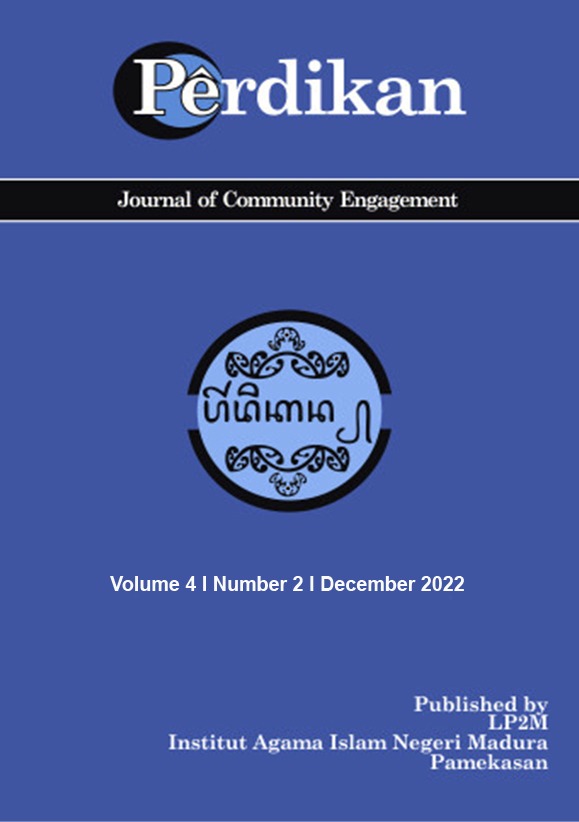DPR (Dengar Pahami Rangkul): community-based intervention untuk meningkatkan kesehatan mental mahasiswa generasi Z di kelurahan Lawangan Daya kecamatan Pademawu kabupaten Pamekasan
 Abstract views: 851
,
Abstract views: 851
,
 PDF downloads: 599
PDF downloads: 599
Abstract
This community service activity aimed to provide an understanding of the importance of maintaining mental health and knowing mental health conditions regularly to Z-generation students in the Lawangan Daya sub-district, Pademawu Pamekasan. The method used in this community service activity was the DPR (Dengar, Pahami, Rangkul) method, which means Listen, Understand, and Embrace. This model was developed from the basic concept of Community-Based Intervention, which in its realization, was carried out through interactive dialogue activities, persuasive expository, group discussions, games, assignments, and mentoring. The results of this dedication received a positive response and impact on the participants. They became aware of the importance of maintaining mental health. In addition, the participants also recognized their strengths as one of the main factors in maintaining mental health. The recommendation for this activity is that it is necessary to hold similar activities with different participants and places.
(Kegiatan Pengabdian Kepada Masyarakat ini bertujuan untuk memberikan pemahaman tentang pentingnya menjaga kesehatan mental dan mengetahui kondisi kesehatan mental secara berkala kepada mahasiswa generasi z di kelurahan Lawangan Daya kecamatan Pademawu Pamekasan. Metode yang digunakan dalam kegiatan pengabdian kepada masyarakat ini adalah metode DPR (Dengar Pahami rangkul). Model ini dikembangkan dari konsep dasar Community-Based Intervention dimana dalam realisasinya dilakukan melalui aktivitas dialog interaktif, ekspositori persuasif, diskusi kelompok, permainan, penugasan dan pendampingan. Hasil pengabdian ini mendapat respon yang positif dan memberikan dampak yang signifikan bagi peserta. Mereka menjadi sadar akan pentingnya menjaga kesehatan mental. Selain itu, peserta juga mengetahui kekuatan diri masing-masing sebagai salah satu faktor utama dalam menjaga kesehatan mental. Rekomendasi kegiatan ini yaitu perlu diadakan kegiatan sejenis dengan peserta dan tempat yang berbeda.)
Downloads
References
Annajih, Z. H., & Sa’idah, I. (2020). Pengembangan panduan permainan tradisional benteng untuk meningkatkan kecerdasan emosional siswa SDN Lawangan Daya Pamekasan. Jurnal Konseling Pendidikan Islam, 1(2), 129–140.
Ayuningtyas, D., & Rayhani, M. (2018). Analisis situasi kesehatan mental pada masyarakat di Indonesia dan strategi penanggulangannya. Jurnal Ilmu Kesehatan Masyarakat, 9(1), 1–10.
Brown, M. (2012). Responses to work intensification: does generation matter? The International Journal of Human Resource Management, 23(17), 3578–3595.
Faiza, A., & Firda, S. J. (2018). Arus metamorfosa milenial. Penerbit Ernest.
Halo.doc. (2022). Mitos atau Fakta, Gen Z Memiliki Mental yang Lebih Lemah. 12 Desember 2022. https://www.halodoc.com/artikel/mitos-atau-fakta-gen-z-memiliki-mental-yang-lebih-lemah
Kartikasari, M. N. D., Fitria, Y., Damayanti, F. E., Prabu, S., Fatsena, R. A., Kusumawaty, I., & Budi, Y. S. (2022). Kesehatan Mental. Global Eksekutif Teknologi.
McLeroy, K. R., Norton, B. L., Kegler, M. C., Burdine, J. N., & Sumaya, C. V. (2003). Community-based interventions. American Journal of Public Health, 93(4), 529–533.
Nuriana, D., Rizkiyah, I., Efendi, L., Wibowo, H., & Raharjo, S. T. (2019). Generasi baby boomers (lanjut usia) dalam menghadapi era revolusi industri 4.0. Focus: Jurnal Pekerjaan Sosial, 2(1), 32–46.
Pasla, P., Asepta, U., Widyaningrum, S., Pramesti, M., & Wicaksono, S. (2021). The Effect of Work from Home and Work Load on Work-Life Balance of Generation X and Generation Y Employees. Journal of Economics, Finance and Accounting Studies, 3(2), 220–224.
Patel, V., Flisher, A. J., Hetrick, S., & McGorry, P. (2007). Mental health of young people: a global public-health challenge.
Putra, Y. S. (2017). Theoritical review: Teori perbedaan generasi. Among makarti.
Sa’idah, I., Atmoko, A., & M. (2021). Aspirasi Karier Generasi Milenial. Edu Consilium: Jurnal Bimbingan Dan Konseling Pendidikan Islam, 2(1), 62–89.
Schleider, J. L., Abel, M. R., & Weisz, J. R. (2015). Implicit theories and youth mental health problems: A random-effects meta-analysis. Clinical Psychology Review, 35, 1–9.
Suara.com. (2021). Survei: Gen Z Rentan Alami Masalah Kesehatan Jiwa Karena Pandemi Covid-19. 12 Desember 2022.
Szasz, T. S. (1960). The myth of mental illness. American Psychologist, 15(2), 113.
Copyright (c) 2022 PERDIKAN (Journal of Community Engagement)

This work is licensed under a Creative Commons Attribution-NonCommercial 4.0 International License.
In order for PERDIKAN to publish and disseminate research articles, we need publishing rights. This is determined by a publishing agreement between the author and PERDIKAN. This agreement deals with the transfer or license of the copyright to PERDIKAN and authors retain significant rights to use and share their own published articles. For both subscription and open access articles, published in proprietary titles, PERDIKAN is granted the following rights:
- The right to provide the article in all forms and media so the article can be used on the latest technology even after publication.
- The authority to enforce the rights in the article, on behalf of an author, against third parties, for example in the case of plagiarism or copyright infringement.
Copyright aims to protect the specific way the article has been written to describe an experiment and the results. PERDIKAN is committed to its authors to protect and defend their work and their reputation and takes allegations of infringement, plagiarism, ethic disputes and fraud very seriously.
If an author becomes aware of a possible plagiarism, fraud or infringement we recommend contacting their PERDIKAN publishing contact who can then liaise with our in-house legal department. Note that certain open access user licenses may permit



1.png)


.png)


